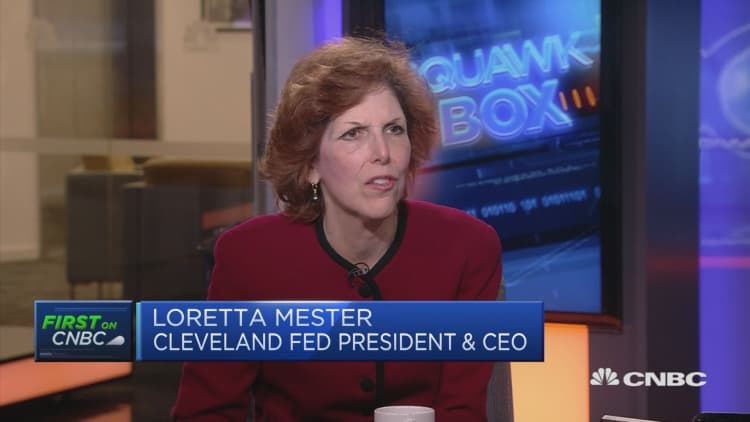
The U.S. Federal Reserve's emergency 50 basis point rate cut on Tuesday was not driven by last week's market capitulation, but it was taken into account, Cleveland Federal Reserve President Loretta Mester told CNBC.
Speaking to CNBC's "Squawk Box Europe" on Wednesday, Mester revealed that she supported the cut on the basis of fresh uncertainty over the medium-term outlook for the U.S. economy.
"The risks around that outlook had gone up significantly. There's still a lot of uncertainty about the course of the virus and what impact it'll have. We have already seen impacts in terms of travel and tourism, we're going to see a reduction in activity for the first half of the year. This was really in response to the economy and the outlook and the risks around the outlook," Mester said.
However, she acknowledged that the market rout had piqued the interest of Fed policymakers.
"You certainly have to take note when the markets are doing that. You don't respond to market volatility per se but if investors pull back as much as they were showing that they did, that also influences business sentiment and also consumer sentiment. There is a signaling in that market about the reevaluation of the outlook on the part of investors, consumers and businesses."
The U.S. Federal Reserve slashed interest rates by half a percentage point on Tuesday in an emergency measure to combat the expected economic fallout from the coronavirus outbreak, sparking a turbulent session which saw the 10-year yield dip below 1% for the first time in history.
Other major central banks have scheduled meetings in the coming weeks and could follow the Fed's lead, including the European Central Bank, the Bank of England and the Bank of Japan.
According to the latest figures from the World Health Organization, at least 91,700 global cases have been confirmed with at least 3,100 deaths.
Mester, a voting member of the U.S. Federal Open Market Committee (FOMC), has reduced her U.S. economic growth forecasts for the first half of 2020 on the back of uncertainty over the spread of the virus.
'Classic supply shock'
Mester told CNBC that the decision to cut by 50 basis points reflected the need for monetary policy action to be "decisive" in the face of a "classic supply shock."
"Certainly lowering interest rates are not going to get people to start traveling again, their social interactions are not going to be changed by a lower interest rate, but the supply shock can easily manifest itself into demand shock if uncertainty continues," Mester said, adding that the situation could "morph into something that could affect business sentiment, consumer sentiment and investor sentiment."
A slump in U.S. inflation followed the financial crisis in 2008, and Mester acknowledged that this supply shock could feed into prices.
"I think you're in for some increase in certain prices, but also depending on what plays out in terms of the outlook, you could actually have it on the other side," she said, adding that an anticipated slump in activity could hurt demand.
"This is a combination of a supply shock initially and then the uncertainty, depending on how it plays out, could have demand side implications."

